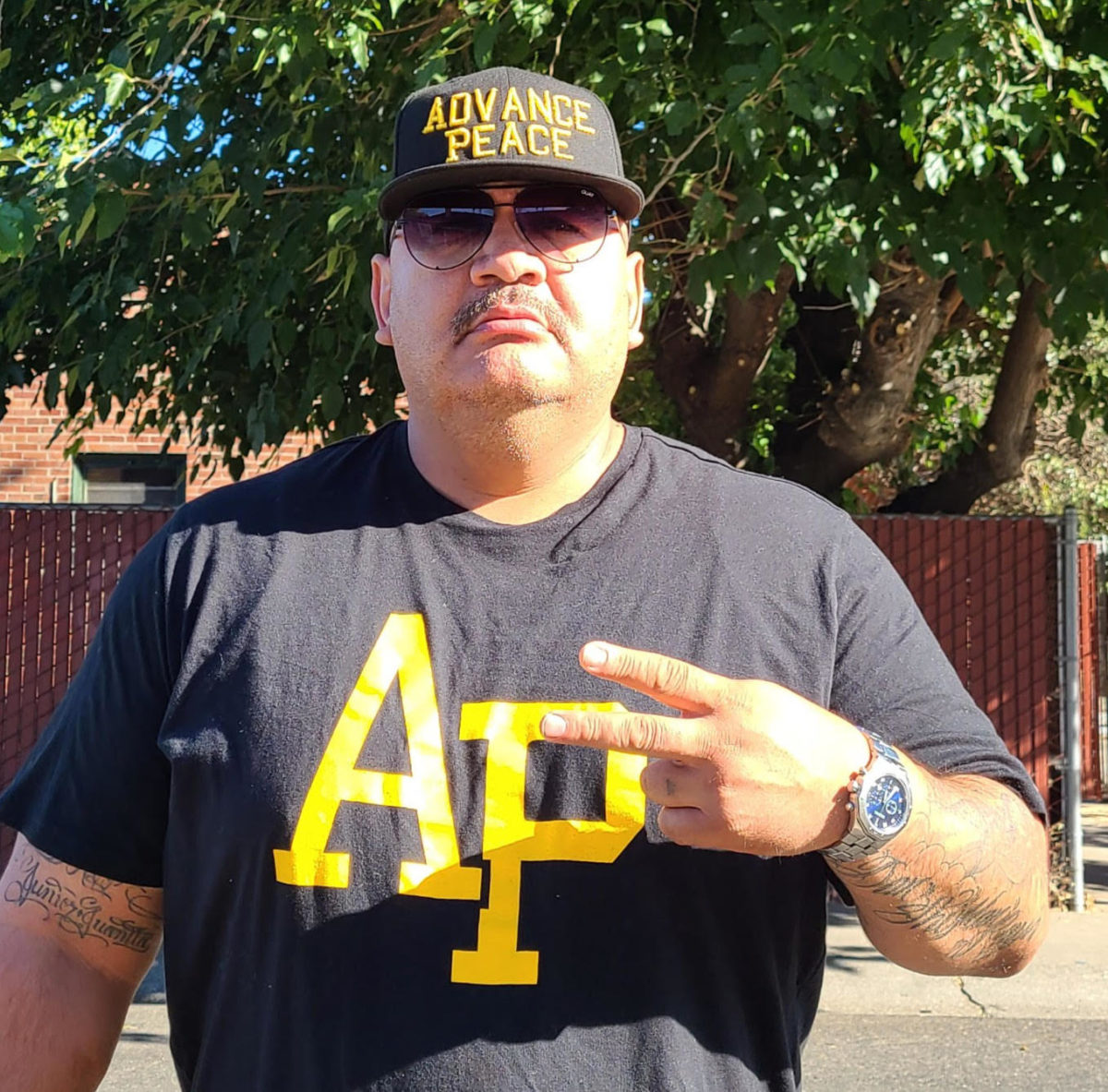Advancing Peace, Against the Odds
In Stockton, California, a police-free gun violence prevention program is standing firm against the tough-on-crime backlash.

“Tough-on-crime” rhetoric is once again on the rise in California, as politicians respond to constituent fears over a perceived—and in some categories, actual—increase in crime. In Stockton, a Central Valley city less than two hours away from San Francisco, headline-grabbing shooting incidents have accentuated a broader uptick in violence that has affected jurisdictions nationwide since the onset of the COVID-19 pandemic. As of late-July, Stockton had tallied 30 annual homicides, a small increase from this point in 2021.
Elsewhere in California, voters in some cities have cited concerns about crime as a justification for backlash against criminal justice reforms. In June, San Franciscans recalled progressive District Attorney Chesa Boudin in a race dominated by narratives that blamed “soft-on-crime” policies for disorder in the city. Los Angeles County District Attorney George Gascón now appears to be on the verge of facing his own recall, in an effort similarly propelled by claims that harsher punishment—and more aggressive policing—are necessary to deter crime.
But despite this backlash, Stockton officials remain committed to an approach designed to address the root causes of the violence that has plagued their city for decades—all without the involvement of law enforcement.
Since 2018, Stockton has been a host site of Advance Peace, a nonprofit organization that seeks to interrupt cycles of gun violence by working closely with the people most likely to be perpetrators or victims of shootings. Rather than coercing these individuals with threats of arrest and decades in prison, Advance Peace offers them an array of services, including therapy to address trauma they may have endured during previous episodes of violence. Perhaps most controversially, the program provides eligible participants a monthly stipend of $1,000—a feature right-wing critics have ridiculed as “cash for criminals.”
The work of Advance Peace begins with months of on-the-ground research by the organization’s staff to identify the highest-risk individuals in target neighborhoods. Outreach workers—known as “neighborhood change associates”—then make inroads to recruit them as “Operation Peacemaker” fellows. Over the course of this 18-month program, fellows develop a close relationship with their outreach workers, who provide counseling and mentorship to help them build a life outside of gangs, guns, and the underground economy. Neighborhood change associates are also tasked with mediating conflicts before they escalate into violence and brokering peace after shootings.
Getting people in the program is hard and sometimes dangerous work. “There’s been dudes who brandish firearms at me” on first contact, Julian Balderama, a neighborhood change associate in Stockton, explained. In those cases, Balderama says he waits a few days before checking in again. “The ones that don’t want to be a part of it, those are the ones that we really, really need in here.”
Becoming Part of the Solution
Advance Peace revolves around the work of people like Balderama. In his mid-40s, stocky and powerfully built, he was talkative, warm, and quick to laugh on a recent day as he pulled his car up to a low-rise apartment building a few blocks from Stockton’s downtown. His client, a 22-year-old named Mark, was already on the sidewalk, wearing black sweatpants and a black t-shirt despite the early June heat.
Mark climbed into the backseat. He’d lost his job three weeks ago and was about to start a new one, but he’d fallen behind on rent. Balderama was taking him to his landlord’s office to pay his back rent, using money provided by Advance Peace.
In the car, Balderama and Mark made plans to go to a local community college to sign him up for classes. Mark is one of about 10 clients that Balderama has on his caseload at any given moment. Each of Stockton’s five neighborhood change associates manages a similar number of fellows. Later in the day, Balderama was picking up another client and taking him to his home to do laundry. Ensuring basic needs are met—clean clothes, food, and stable housing—is a crucial component of keeping fellows out of the cycle of gun violence, Balderama said.
“I know my brother is going to look out for me and I’m gonna look out for him,” Mark said of Balderama.
Balderama’s devotion to this work is motivated in part by the feeling of redemption it gives him. His past contribution to the city’s violence started at age 14, when his brother was murdered. More recently, he was released from Pelican Bay State Prison in 2017, after serving 27 months on drug charges. Upon returning to Stockton, Balderama said he was determined to do better by his wife and three children. He started informally negotiating conflicts between rival gang members, working to defuse them before they blew up into violent confrontations. Advance Peace heard about Balderama’s mediations and hired him in 2018.
Now Balderama’s days revolve around his clients—young people who are still in the life he’s since left behind. He spends his mornings conferring with other neighborhood change associates about what’s going on in the city, identifying hot spots where tempers might boil over into violence, and discussing strategies to alleviate tension.
Following this more compassionate approach, Advance Peace has become one of a handful of programs that have been associated with reductions in gun violence. A study examining the first two years Stockton’s Advance Peace program found that the organization’s work contributed to a 21 percent reduction in gun homicides and assaults compared to averages in the years before the program’s launch.
The success of Advance Peace, and community-based violence prevention programs like it, is completely dependent on “the relationships, the credibility and the expertise” of its outreach workers, explained Shani Buggs, an assistant professor with the Violence Prevention Research Program at the University of California, Davis, Health.
By leveraging their lived experience, neighborhood change associates are able to understand “who’s likely to be at high risk for violence involvement,” said Buggs. People like Balderama “have influence over those individuals, can reach them, can talk to them, can get to the center of the crises if something breaks out.”

Stopping Gun Violence Without Cops
Advance Peace first launched in Richmond, California, in 2009 when the city’s homicide rate was nine times the national average. The program combined elements of two existing approaches to gun violence prevention. One is Operation Ceasefire, which also offers services like counseling and job training to people who are typically responsible for an outsized share of gun violence. The other is Cure Violence, a program that conducts conflict mediation and has been implemented in 20 U.S. cities.
But there are key differences between these programs. Ceasefire works on a more traditional carrot-and-stick model, employing police surveillance and the threat of arrest and prison against participants who fail to change their ways. And while Cure Violence mediates conflict and offers support to clients, it provides a different range of services and does not provide direct financial assistance.
Advance Peace, in contrast, was built on the belief that the specter of punishment may not always be enough motivation for people to undertake the incredibly difficult work of personal transformation—especially if nothing is done to address the root causes of violence.
Based on that approach, the program’s monthly stipend is intended to provide a degree of financial stability to fellows who are often economically insecure and relying on the drug trade or other illegal activities to get by. Advance Peace works to equip fellows with the tools to achieve longer-term stability through life-skills classes and guidance navigating social services. There are also courses involving cognitive behavioral therapy and substance abuse treatment, meant to address the psychological and emotional trauma associated with a lifetime of bearing witness to violence.
There is growing evidence that this model works. A 2019 evaluation found that Richmond’s Advance Peace program was associated with a 55 percent decrease in firearm homicides and hospitalizations, between 2010 and 2016. Preliminary research published in June by the University of California, Berkeley, School of Public Health and members of Advance Peace suggests that outreach workers in Sacramento, Stockton, and Richmond, helped to mitigate a pandemic-related increase in firearm homicides in neighborhoods where the program was active. In 2020, the Center for American Progress held up Richmond’s Advance Peace program as a model for jurisdictions looking for alternatives to the criminal justice system.
Can ‘Ragtag, Ex-Gangsters’ Succeed Where Policing Fails?
Advance Peace is currently operating in nine U.S. cities: Five in California—Woodland, Fresno, Vallejo, Stockton, and Richmond—as well as Ft. Worth, Texas; Lansing, Michigan; Orlando, Florida; and Rochester, New York. Plans are also in motion to launch new sites in New York City and a handful of other locations.
The organization has been selective about expanding, said Khaalid Muttaqi, chief operating officer of Advance Peace. Jurisdictions must make a minimum three-year commitment to Advance Peace, and they cannot pick and choose which parts of the program they want to implement—they take all of the program or none of it.
This can be a sticking point for cities that typically operate on an annual budget, and tend to be more comfortable working directly with the police, Muttaqi explained.
“Homicide units, they have, you know, million-dollar budgets,” Muttaqi said. “So it’s hard for them to even imagine the possibility that a bunch of what they see as ragtag, ex-gangsters can possibly be more effective in the space of gun violence, intervention, and mediation than them.”
In Stockton, as in many U.S. cities, the police budget has been steadily increasing for years, with no corresponding effect on violent crime. Police spending reached $153 million in 2022, and the city’s proposed 2023 budget would raise police spending again, to 53 percent of Stockton’s entire general fund budget for the year. Advance Peace has meanwhile operated on an annual budget of around $1 million, none of which comes directly from the city.
Supporters of alternative approaches to violence prevention maintain that they could have a much greater impact if they were fully and consistently funded, and had even a fraction of a city’s law enforcement’s funding. Instead, they are forced to rely on unstable funding streams often subject to shifting political whims.
In Sacramento, for example, officials opted not to renew Advance Peace in 2021 after the end of its four-year pilot, even as evidence suggested it was associated with a significant drop in shootings. In the year since, the city has experienced elevated levels of gun violence.

Defining Success
Muttaqi is open about the fact that not all of the people Advance Peace serves leave guns and violence behind them. In Sacramento, five fellows were arrested on gun-related charges during the 18-month fellowship. More than half were arrested on other charges. One fellow was shot and killed. “They’re hard to reach,” Muttaqi said. “And to be quite honest with you, they can be very hard to serve.”
While there is evidence that Advance Peace has been effective at reducing gun violence, it’s less clear which aspects of Advance Peace have the greatest impact. The program offers a multitude of services, and it’s difficult to determine which is most important to its overall success—or whether its effectiveness in reducing gun violence depends on all facets working together.
Even in the face of these promising results, Advance Peace continues to have its share of critics. Last month, lawmakers in Fresno moved to pull city funding for the program, following reports that a worker associated with Advance Peace had been arrested on gang charges. The city is now working to restructure its contract with the nonprofit, which received a federal grant of $300,000 in March to continue operating in Fresno.
In Stockton, Advance Peace is about to see its budget doubled, thanks to $1 million in new funding from state grants, which will cover salaries for four additional employees, Muttaqi said. But advocates say this won’t change the fact that they must constantly fight, against the odds, to continue their work.
“With the right investment and the right commitment … we can end urban gun violence in these neighborhoods,” Muttaqi said. “It’s not easy, but there’s actually a solution that we can point to.”
Update: This story has been updated with additional information about the services Cure Violence provides.
